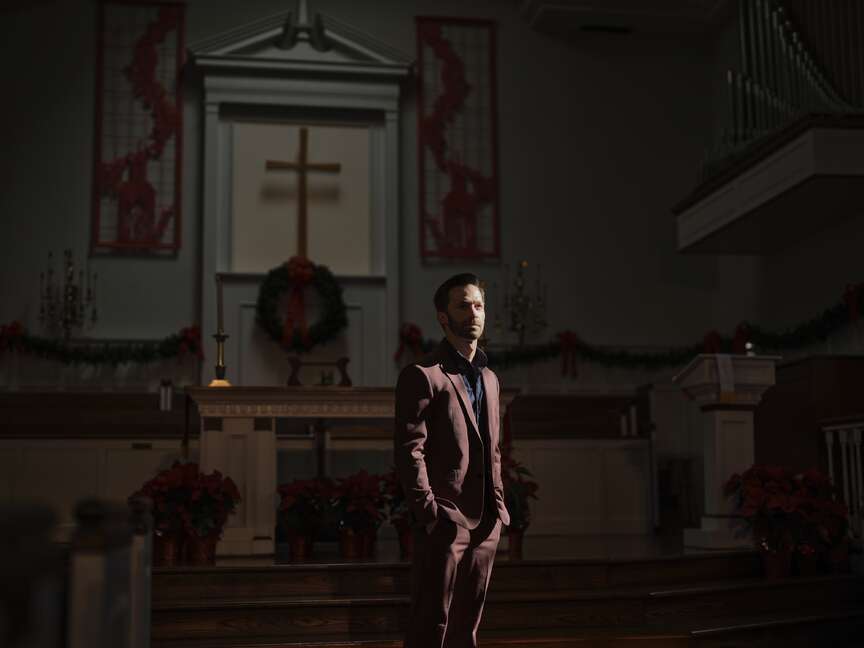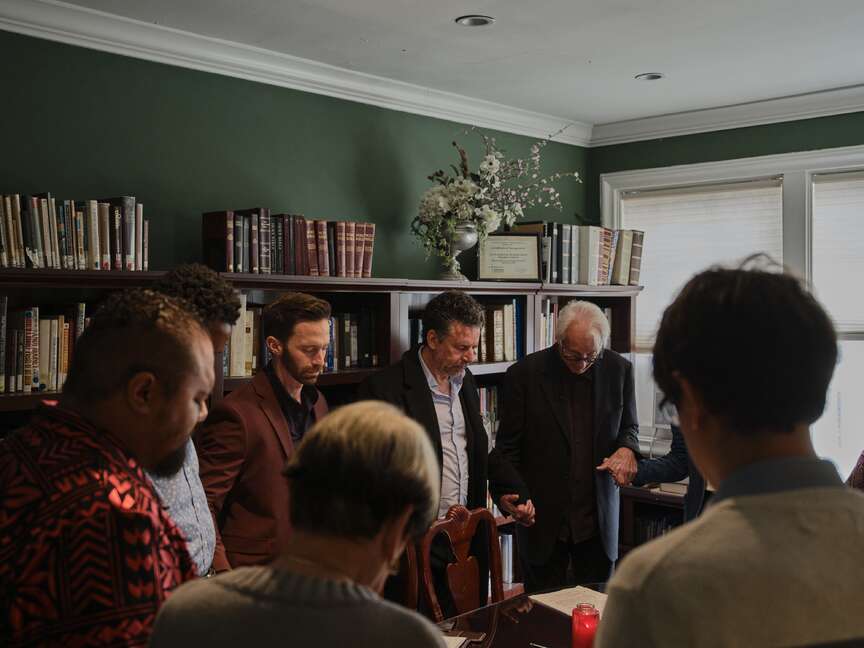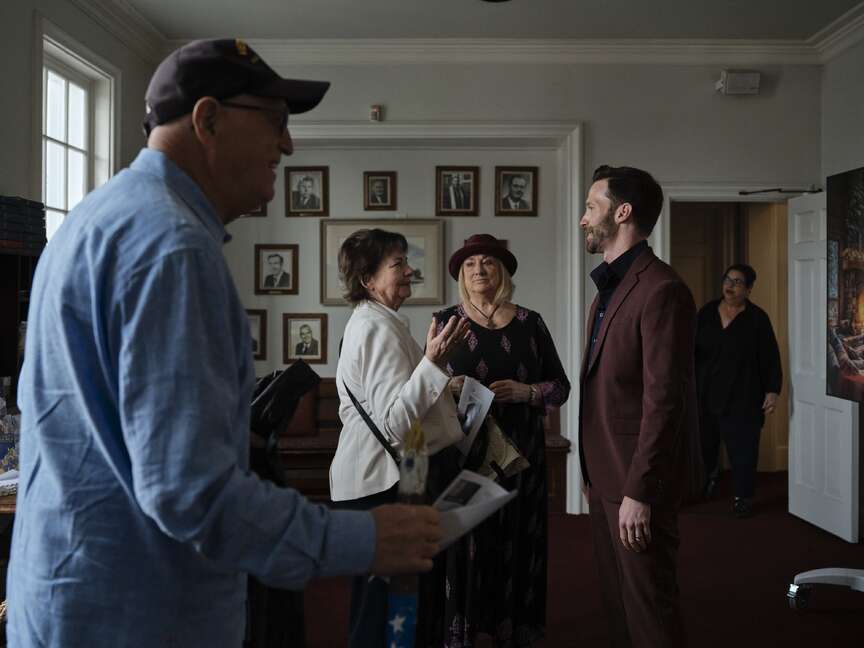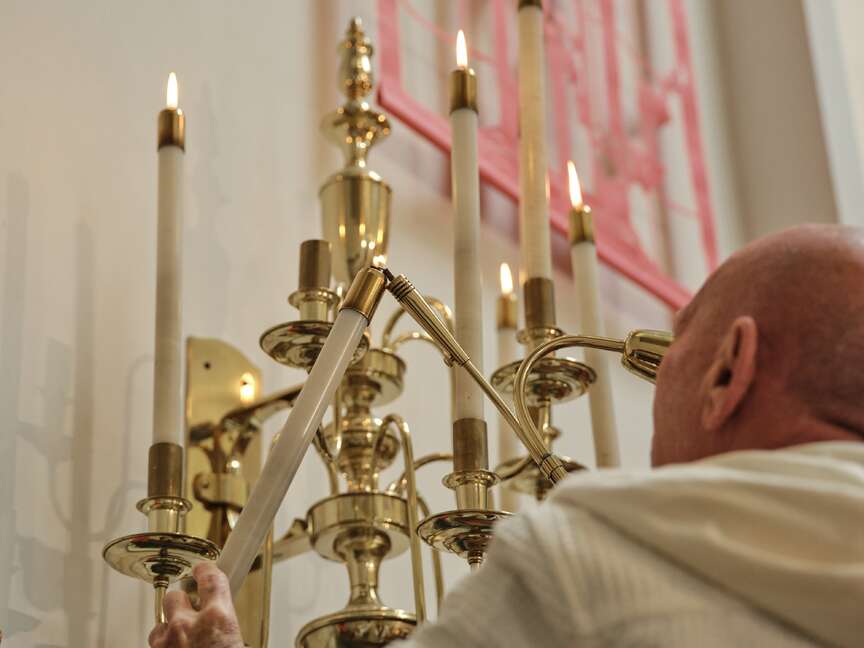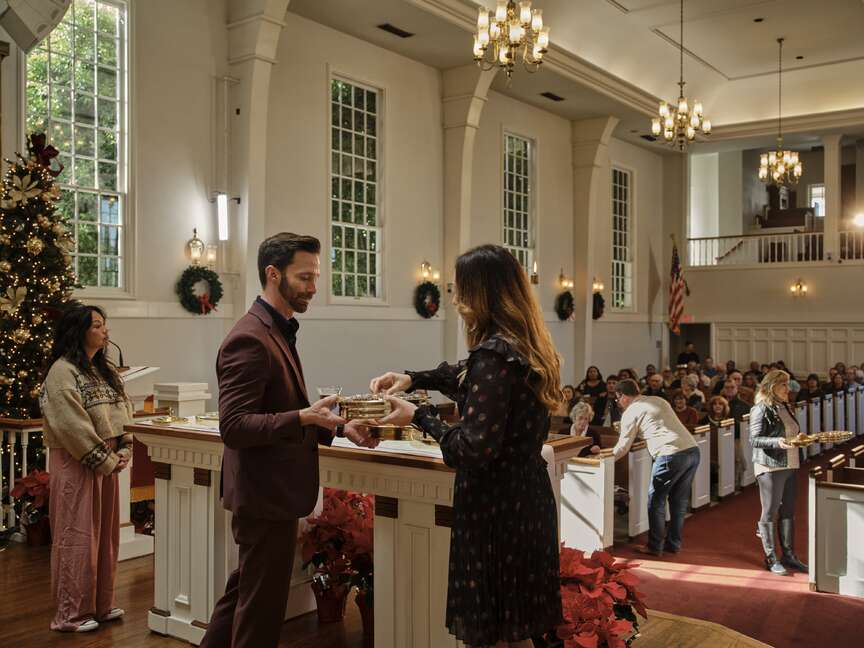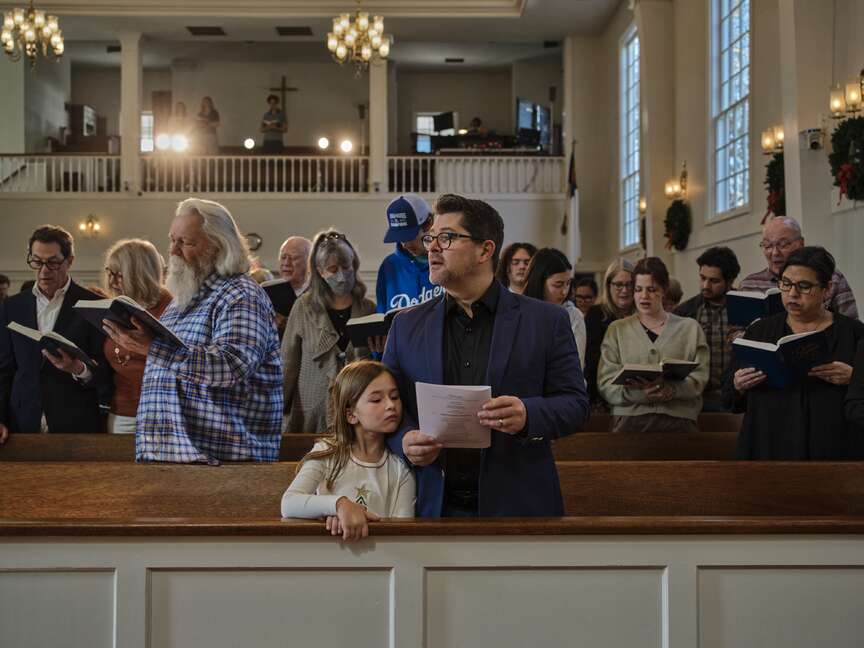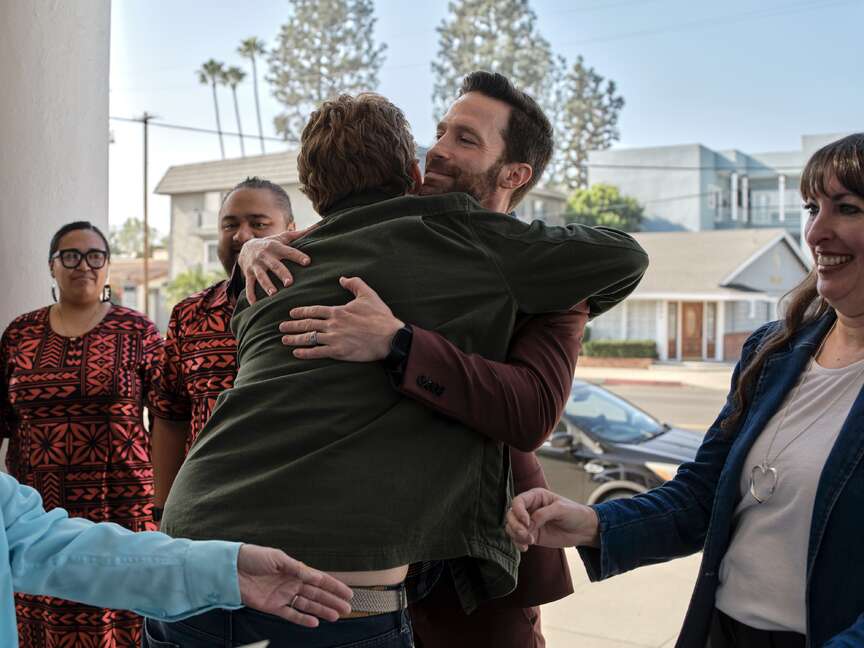Persuading the Republicans, Democrats and independents in his pews to stay and pray with one another is getting more complicated, so the Rev. Jonathan Hall has lots of strategies for his congregation in suburban Los Angeles.
When he preaches what the Bible says about the mandate to care for migrants, Hall focuses on the story of Mary and Joseph rather than modern-day wanderers. He selected a book of scripture readingsthat sets out specific text for every Sunday, so no one could question whether his picks were making a political statement. And when somebody tells him they think a sermon was aimed at a specific politician, he says: "That's one way to look at it!"
Both before and after the presidential election, this has been a season of particular challenges for worshipers at Hall's First Christian Church of North Hollywood. Theirs is a politically blended congregation, one that is trying to do what is increasingly rare and tricky for modern religious communities: Hold together despite their different views.
A key part of the effort is figuring out what's "too political" for a place of worship - or whether "being political" is the whole point of the Gospel.
At First Christian, members this year took red and blue paint, declared them "Pentecost" and "Advent" - rather than Republican and Democrat - and combined the colors. Then, with the purple paint they created, they painted wordson the white cloth covering the sanctuary's Communion table. Among them, the word "one."
Yet several congregants have quit the church because of their political differences. Two members of a family left because they thought a film Hall had planned to show about Christian nationalism was too one-sided and anti-Republican. One woman left when she found out other congregants would be attending Donald Trump's inauguration. Someone else walked outof services early on the Sunday after the election, feeling that a leader on the stage was too focused on consoling people who voted for Vice President Kamala Harris.
"If you're at a football game, one side wins and everyone leaves. With a church [and the election], it's like everyone is still there," said Hall, a 41-year-old Alabama native who has led the church north of Los Angeles for two years. "The popcorn is still on the ground, the Coke cups, the mess. Fifty percent of people are upset, and we have to pick up the pieces."
He faces the biggest challenge: "If I'm a good pastor, I'm both comforting you and confronting you. But I also need to be a prophet, right? You're supposed to come to church to look for questions that will change your life."
First Christian is part of the Disciples of Christ, a small mainline Protestant denomination that started in Kentucky in the 1800s. The church, which celebrated its 100th anniversary this year, has just over 1,000 members and draws 160 or so people on a typical Sunday. The Disciples began as an effort to unify Christian groups who had broken over theology and worship styles.
Before Hall, the same pastor had led First Christian for 52 years. Congregants say the late Rev. Robert M. Bock didn't speak about contemporary political issues in church - even during the Vietnam War, which marked the start of his tenure. Hall is trying to forge a new way.
Sunday morning services have long been the "most segregated hour" in America, as Martin Luther King Jr. declared, calling churches' racial segregation "one of the shameful tragedies" of the nation.While many congregations look different now, experts say the most powerful divider may be that Americans organize their religious lives around their politics.
In his upcoming book, "The Big Church Sort," political scientist and ordained Baptist pastor Ryan Burgedetails how religion mirrored the polarization asthe Republican and Democratic parties became more uncompromising on issues like abortion and LGBTQ+ rights. Then came the pandemic and contentiouspolicies on masking and shutteringhouses of worship. The past decade is filled with stories of congregations splitting and pastors being pushed out or quitting.
"Choosing what church to attend (or attending church at all) is impacted, in no small part, by how we orient ourselves to the political world around us," Burge writes. "Stated even more succinctly - politics impacts religion much more than religion impacts politics."
For the most part in Christianity, liberals and moderates have left White Evangelicalism and much of other majority-White Christian groups as well, Burge said in an interview. Among non-White populations, the sorting works differently, but partisan affiliation still increasingly drives where people worship.
Clergy who aspire to have a purple church often walk on eggshells, and congregants yield more power.
"In college I was told to comfort the afflicted and afflict the comfortable," Burge continues. "But it's hard to afflict the comfortable because they're the ones who write the big checks that keep the lights on. That's been true forever."
The Rev. Terri Hord Owens, who is president of the Disciples of Christ, agrees that the challenges for pastors like Hall are huge. She knows a pastor who had 300 congregants leave because he wouldn't endorse Trump this fall. Sixteen churches in Texas left the denomination because a member church hosted a drag queen bingo event.
In Hord Owens's view, congregations must find a way to demand more of their faith than noncontroversial efforts like hosting soup kitchens.
"Pastors are treated as hired hands in some of our churches," she said at a fall conference on Christianity and democracy, citing clergy who are fearful to preach famous parts of scripture that emphasize justice for the less fortunate. In Matthew 25, for example, Jesus says Christians who don't care for the poor, the hungry, the stranger, the prisoner may not ascend to heaven. "Whatever you did not do for one of the least of these, you did not do for me," the scripture says.
"If church is just a vehicle through which you think you're doing good things and not a life you live in response to however you understand the holy, then people who are trying to be prophetic are bumping up against people for whom this is Sunday coffee hour," Hord Owenstold the Washington conference. "We are bringing young people out of seminary who are bright eyed and fearless, and they are slamming up against institutional residue."
What does the opposite of that look like in a purple church?
At First Christian,it looks like intention. After Hall scheduled the Christian nationalism film this summer and a slice of the congregation revolted, he shifted the eventinto a conversation on the topic that broke into small groups. More than 80 people participated.On Election Day, the church was open for a day-long prayer vigil for peace, nonviolence and unityonce votingended.
Hall knows some clergy of various faiths and denominations who barely addressed from the pulpit the assassination attempt on Trump because they feared anything they'd say would be divisive. He worries some fellow clergy might think he's not being prophetic enough.
Rodney Gould, a Republican attorney who is president of First Christian, had opposed showing the Christian nationalism film out of concern thatit was "too explosive." Even so, hewound up finding the group conversation productive. "It allowed people to get together and discuss what it means to be in a covenantal relationship where we try to respect each other's views and opinions," he said.
By contrast, Drew Powell said the congregations needs "much more" collectiveexperiences like that movie.
"We can't sit idly by and not want to get our hands dirty," said Powell, an actor, a Democrat and a church elder whose father is a retired pastor. "We're going to be in big trouble if no one wants to talk about anything because one side or the other will get crazy loud and obnoxious and angry. Because we're at a very unique time in our country's history. There is no doubt about that."
First Christian knows the topic of deportations may become very real and very near given Trump's promise to kick out huge numbers of undocumented immigrants during his second term as president. Within the predominantly White congregation, a cherished member is undocumented.
Ann Wilson, a board member who canvassed with her husband in Nevada for Harris, said she couldn't recall having a political conversation in the church in the decades she has been there.
"These are people I have loved for 35 years, and I cannot turn off that love over some dumb candidate that has come up in the last 10 or 15 years. That wouldn't happen," she said. Yet if the fellow church member were deported, she'd absolutely "stand with him. Yes I would."
Kevin Bailey, a Republican and head deacon, felt encouraged by the vibe on the Sunday after the election.
"Church was very normal to me that day," he said. "Everybody was polite. You know, whether you were disappointed or encouraged by whatever the results were, it was very encouraging. It kind of made me feel like we're going to be just fine."
During services this month, Hall continued to walk his intentional path. When he preached about Isaiah "building on the ruins," some on the left assumed he meant the ruins of the 2024 election. Others may have assumed he meant "the ruins of Biden inflation," he said.
He preached on Christmas Eve about the Angel Gabriel, who visited Mary and Joseph and assured them that even if they felt completely powerless, they had more power than they realized. And the Gospel's message to America's uncertain future is that "wisdom walks alongside each and every one of us."
When he thinks of Trump's upcoming inauguration, potential deportations and all the possible challenges to come, Hall is focusing on what he describes as the "power of Jesus" to influence his congregation once things go from something remote in Washington to the lives of people they know.
"A lot of people want me to take the bait," he said. "But I won't take it."


